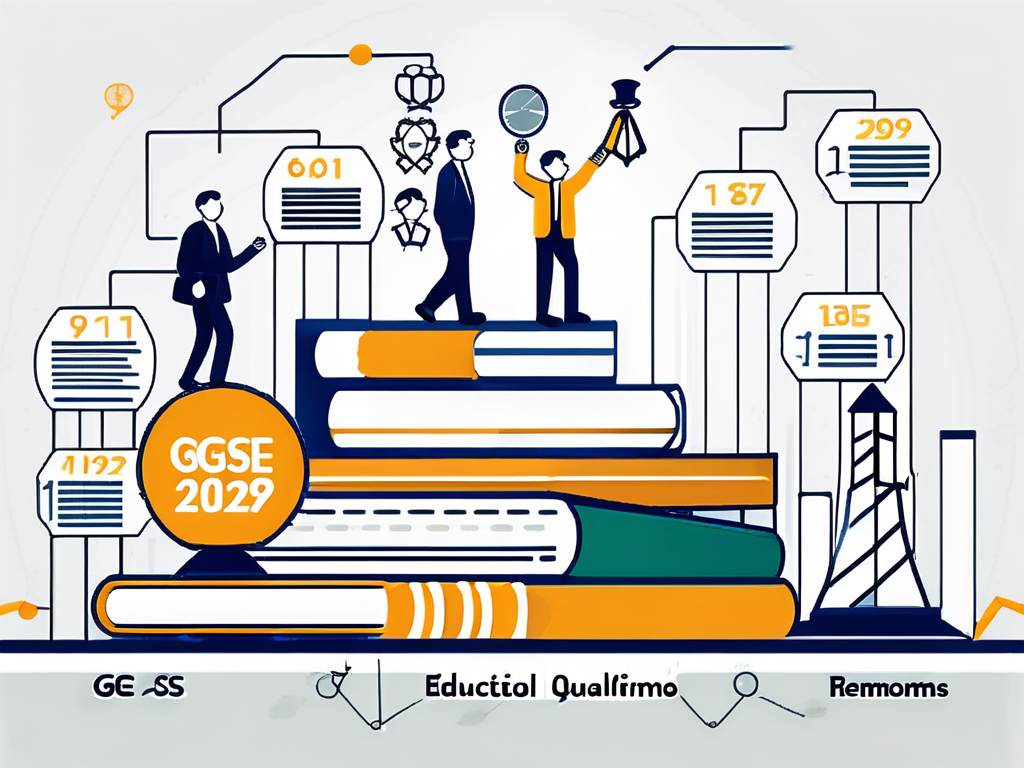General Certificate Of Secondary Education: International Education Explained

The General Certificate of Secondary Education (GCSE) is a qualification awarded to students in England, Wales, and Northern Ireland, typically at the age of 16, after they have completed their compulsory school education. It is a globally recognised qualification that provides a solid foundation for further study and is a critical stepping stone towards higher education and professional development. This article delves into the intricacies of the GCSE, with a particular focus on its role and significance in international education.
The GCSE is a comprehensive programme that covers a wide range of subjects, including core subjects like English, Mathematics, and Science, as well as optional subjects such as History, Geography, Art, Music, and many more. The curriculum is designed to provide a broad and balanced education, equipping students with the knowledge, skills, and understanding they need to thrive in the 21st century. The GCSE is not just about academic achievement, but also about developing critical thinking, problem-solving, and communication skills, fostering creativity and innovation, and promoting personal and social development.
History and Evolution of the GCSE
The GCSE was introduced in the late 1980s as a replacement for the O-Level and CSE examinations. The aim was to create a single, unified system of examinations for all students, regardless of their ability or future aspirations. The GCSE was designed to be more inclusive and flexible than its predecessors, offering a wider range of subjects and assessment methods, and recognising a broader spectrum of achievements.

Over the years, the GCSE has undergone several changes and reforms to keep pace with the changing needs of students, employers, and higher education institutions. These include the introduction of new subjects, changes to the grading system, and revisions to the curriculum and assessment methods. Despite these changes, the core principles and objectives of the GCSE have remained the same: to provide a high-quality, broad-based education that prepares students for further study and the world of work.
GCSE in the International Context
In the globalised world of today, the GCSE has gained significant recognition and acceptance. It is now offered in many international schools around the world, and is recognised by universities and employers worldwide. The international version of the GCSE, known as the IGCSE (International General Certificate of Secondary Education), is specifically designed for an international audience, with a curriculum that is relevant and engaging for students from different cultures and backgrounds.
The IGCSE offers a flexible and adaptable curriculum, with a wide range of subjects that cater to the diverse interests and aspirations of students. It also provides a rigorous and robust assessment framework that ensures a high standard of achievement. The IGCSE is a highly respected qualification that opens doors to higher education and employment opportunities around the world.
Structure and Curriculum of the GCSE
The GCSE is typically a two-year programme, starting in Year 10 and ending in Year 11. Students usually study between 8 and 10 subjects, including compulsory subjects (known as core subjects) and optional subjects (known as elective subjects). The core subjects are English, Mathematics, and Science, while the elective subjects can be chosen from a wide range of options, including Humanities, Languages, Arts, and Vocational subjects.
The curriculum for each subject is set by the examination boards, which are organisations responsible for setting and marking the GCSE exams. The curriculum outlines the content to be covered, the skills to be developed, and the assessment methods to be used. It is designed to be challenging and stimulating, encouraging students to engage with the subject matter, think critically, and apply their knowledge and skills in different contexts.
Assessment and Grading
The GCSE is assessed through a combination of written exams, coursework, and practical assessments. The exact mix of assessment methods depends on the subject. For example, in Science, students may be assessed through written exams, practical experiments, and a research project, while in Art, they may be assessed through a portfolio of work and a practical exam.
The grading system for the GCSE has recently changed from a letter-based system (A* to G) to a number-based system (9 to 1), with 9 being the highest grade. This new system is designed to provide more differentiation at the top end of the scale, recognising exceptional performance. The grades are awarded based on the student’s performance in the exams and assessments, reflecting their knowledge, understanding, and skills in the subject.
Benefits of the GCSE
The GCSE offers numerous benefits to students. Firstly, it provides a broad and balanced education, covering a wide range of subjects and promoting a holistic development. This not only equips students with a solid academic foundation, but also helps them develop a range of skills and attributes that are highly valued in higher education and the workplace, such as critical thinking, problem-solving, creativity, and resilience.
Secondly, the GCSE is a highly respected qualification that is recognised by universities and employers around the world. This means that students who achieve good grades in their GCSEs have a wide range of options for further study and career progression. Furthermore, the process of studying for the GCSEs, with its emphasis on independent learning, research, and time management, prepares students for the demands of A-Levels, university study, and the world of work.
GCSE and International Education
In the context of international education, the GCSE plays a crucial role. It provides a common framework and standard of education that is recognised and understood around the world. This makes it easier for students to move between different education systems and to apply for university or employment in different countries.
The international version of the GCSE, the IGCSE, is specifically designed to be culturally sensitive and globally relevant. It offers a flexible and adaptable curriculum that caters to the diverse needs and aspirations of students around the world. This makes it an ideal choice for international schools and for students who are planning to study or work abroad.
Challenges and Criticisms of the GCSE
Despite its many benefits, the GCSE has also faced some challenges and criticisms. One common criticism is that the curriculum is too narrow and academic, focusing too much on rote learning and exams, and not enough on practical skills and real-world applications. Some critics argue that the GCSE does not adequately prepare students for the challenges of the 21st century, such as digital literacy, entrepreneurship, and global citizenship.
Another challenge is the issue of grade inflation and the perceived devaluation of the GCSE. In recent years, there has been a trend of increasing pass rates and higher grades, leading some to question the rigour and credibility of the GCSE. The recent reforms to the GCSE, including the introduction of the new grading system, are aimed at addressing these concerns and ensuring that the GCSE remains a robust and rigorous qualification.
Future of the GCSE
The future of the GCSE is a topic of ongoing debate and discussion. Some argue for a radical overhaul of the system, proposing alternatives such as a baccalaureate-style qualification that includes a wider range of subjects and skills. Others argue for a more incremental approach, focusing on improving the existing system through reforms to the curriculum, assessment, and grading.
Despite these debates, it is clear that the GCSE will continue to play a crucial role in the education system, both in the UK and internationally. It is a well-established and highly respected qualification that provides a solid foundation for further study and career progression. As the world continues to change and evolve, the GCSE will need to adapt and innovate to meet the changing needs of students, employers, and society.
Conclusion
The General Certificate of Secondary Education (GCSE) is a key milestone in a student’s educational journey. It provides a broad and balanced education, equips students with essential knowledge and skills, and opens doors to further study and career opportunities. In the context of international education, the GCSE and its international counterpart, the IGCSE, play a crucial role in providing a common framework and standard of education that is recognised and understood around the world.
Despite the challenges and criticisms, the GCSE remains a robust and rigorous qualification that is highly respected by universities and employers. As the world continues to change and evolve, the GCSE will need to adapt and innovate to meet the changing needs of students, employers, and society. The future of the GCSE may be uncertain, but its importance and relevance in the world of education is unquestionable.
Elevate Your Teaching Career with IPGCE
Building on the foundation of GCSE and IGCSE qualifications, educators seeking to advance their careers can now embrace the next step in professional development with the International Postgraduate Certificate in Education (iPGCE) offered by IPGCE. This Level 7 programme is designed to enhance your qualifications, connect you with a global network of professionals, and provide you with a deep understanding of international curricula. With flexible online study options, the iPGCE is the perfect solution for working teachers aiming to overcome the barriers of stringent qualification requirements, limited career progression, and professional isolation. Join the ranks of educators who have seen a significant increase in interview callbacks, promotion rates, and salary growth. Don’t let inadequate credentials hold you back. Join the UK’s #1 Teacher Training Course today and transform your teaching career.
